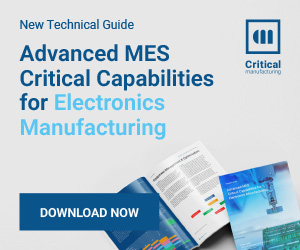EMS 2.0 – What is Digital Transformation in Electronics Manufacturing?

With the support of Bright Machines, one of the key players in applying digital technologies to manufacturing, EMSNOW is hosting a series of webinars to learn more about the evolution of the EMS industry. The four-part series explores two main trends we have observed: digitalization and industrialization. Pundits have been talking about digitalization, and we agree that’s an important part of what’s been going on. But we also believe there are evolving production requirements for electronics manufacturing as we move towards the factory of the future and we discuss those as well.
In case you haven’t been paying attention – and we understand, there’s been a lot going on – the electronics manufacturing industry has been going through a bit of a shake-up. It started before the pandemic, but has been accelerated by the fact that people who used to spend a lot of time literally in the clouds, flying around the globe– are now spending all their time in the virtual Cloud on Zoom meetings trying to manage their businesses remotely. Long global supply chains have been disrupted and electronics manufacturing executives are rethinking their business models to gain resilience and agility.
But what are we really talking about when we use terms like digitize, digitalize, and digital transformation? A Forbes article on the topic brought some clarity for us. Turns out there is a big difference between the three terms. According to Jason Bloomberg, digitization is when you take all your old VHS tapes and put them on a jump drive to share with the kids. A simple change of how information is stored, from one media to another, analog to digital.
The definition of digitalization is murkier. Bloomberg explains at length, but it boils down to taking a business process online. It involves changes to the way people work in a business, but the business model itself doesn’t change. So an example would be working from home during the pandemic. Or using a CNC lathe instead of a manual one.
The third term, digital transformation is a different story, and that is why we at EMSNOW are calling this EMS 2.0. We believe the industry is fundamentally changing the business model. Companies are learning how to use automation, artificial intelligence, IoT connectivity, and data management technologies to manufacture electronic products more efficiently, and with transparency. That is the digitalization of their business processes. But they are then going the extra mile and changing their business model by finding different ways to monetize these activities – digital transformation.
The first show of the first season was with an OEM based in Europe. Eric explored precisely how smart manufacturing is bringing real competitive advantage to the industry. His guests discuss the challenges and the opportunities of implementing the factory of the future from their decades of experience in global electronics manufacturing. Jens Ebbesen, SVP Supply Chain at Kamstrup, a smart meter OEM, explains the transformation of the company from a pure hardware manufacturer to a solutions provider in sustainability energy and clean water by adding data collection, AI and hosting services to their offering. He and Bartosz Mazurek, VP of Industrial Solutions at Bright Machines share their thoughts about automating the complex ‘back end’ assembly processes in electronics manufacturing, where the industry is headed, what the end state of Industry 4.0 really will be, and much more.
In the second episode, Eric speaks with Steve Frisch, COO at Plexus and Amar Hanspal, CEO at Bright Machines to learn exactly how Industry 4,0 enables EMS companies to transform their business to build competitive advantage into manufacturing processes. They discuss how the convergence of increased computing power, cost effective sensing technology, optical inspection, and pattern recognition has enabled unheard of capabilities for forecasting, preventive maintenance, zero defect efficiencies and much more. Plexus has found that by transforming both the manufacturing side and the ‘back end’ business processes, it is now possible to deliver a whole new customer experience.
The guests for the third episode are Molex Chief Digital & Technology Officer Mike Giresi and Bright Machines’ CTO Brian Mathews. In Episode four Eric is joined by Celestica COO Todd Cooper and Bright Machines COO Tzahi Rodrig.
Season two is still in the planning stages. These discussions are fascinating, and since we are recording them, they can be accessed and studied at your leisure. We encourage you to take a listen, and then let us know how your digital transformation is going. Interesting times.












